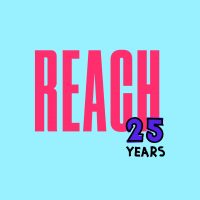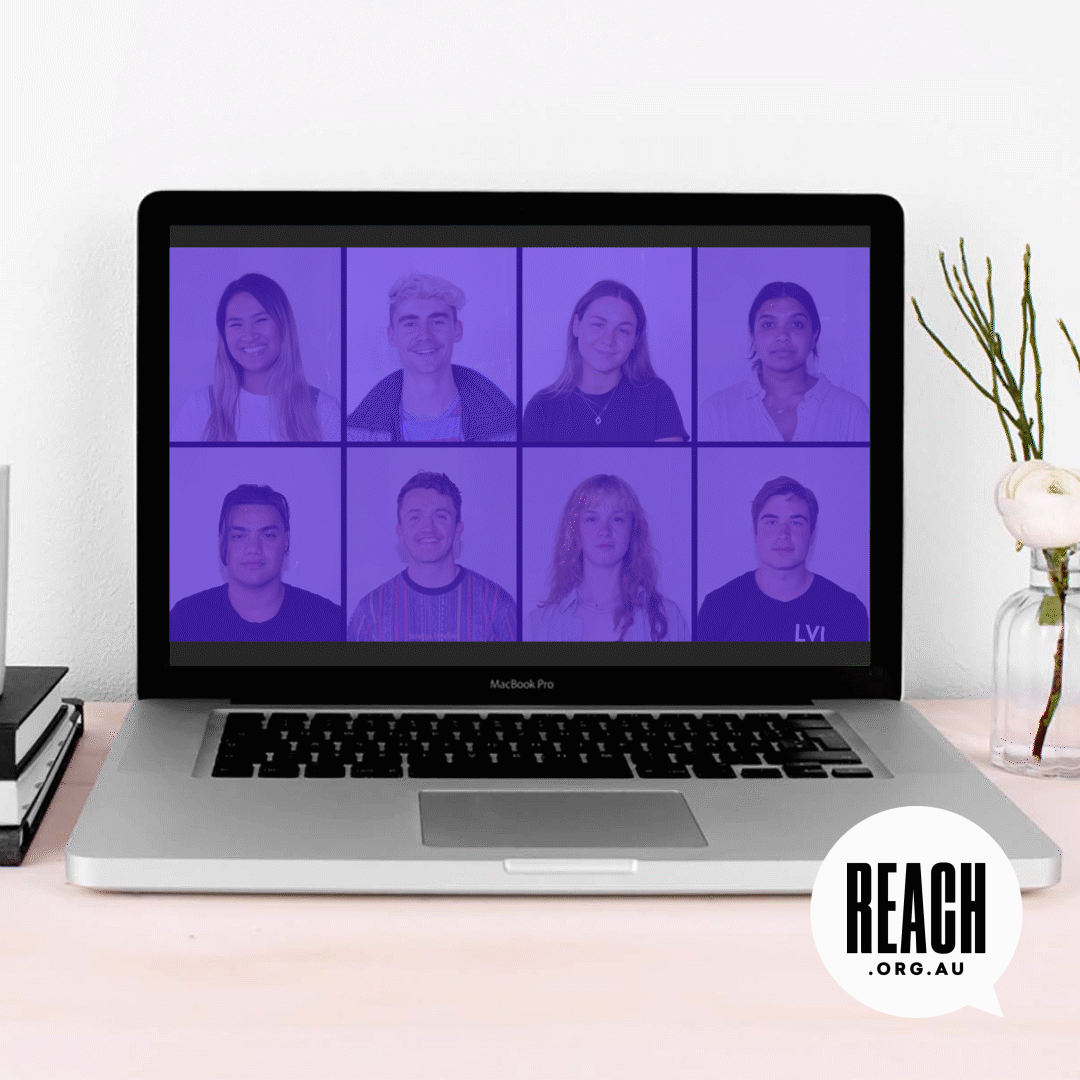
Fused Online: An Impact Report

Fused is a 5-week after hours program for young people to experience a unique youth-led environment that encourages them to challenge themselves, connect to others and grow their self-awareness and resilience. Fused is a safe space for young people to push their comfort zone and explore who they are.
We’ve been running this program since the early 2000’s and it’s always been place-based and in person. As COVID-19 disrupted our lives, we were presented with an opportunity to take our programs online. Many of us were trepidatious about how a Reach workshop would be experienced online, and we were particularly concerned about how we could deliver an online program that didn’t compromise our child safety and wellbeing framework. But with so much uncertainty and change hovering over young people, we knew we needed to give it a shot.
What we didn’t anticipate was just how successful and impactful the program would be! Our crew were able to still create spaces that were safe, inclusive and allowed young people to open up about what was going on for them. And whilst we certainly missed being in the same (physical) room together, we were still able to create the magic that happens at a Reach workshop.
This impact report shares testimonials and insights from young people, their parents/guardians and of course, the Reach Crew. If you’re interested in learning more about the work undertaken by our Programs and Wellbeing team to pivot to online delivery, please click here. Believe it or not, we didn’t just stumble into an online program. There was weeks of researching, testing and evaluating to ensure we didn’t compromise the safety or wellbeing of our participants, and importantly, the essence of our programs.
Outcomes
- To express yourself authentically and without ego
- To be seen and feel connected to others
- To gain a greater sense of self and build more confidence
- To discover tools that help navigate life’s challenges
Why we run Fused
Adolescence is a period of increased risk taking, impulsivity and change. However it is also a time of significant opportunity and growth. During this time, a young person’s experiences shape and influence who they are and can impact their life well into adulthood. This is a crucial time, where we can empower young people through providing positive experiences that help build and shape who they are, enabling them to flourish and thrive.
Fused allows for the exploration of the wider experience of being an adolescent and can be responsive to broader community and world factors that impact them. Fused this term explored some of these broader impacts allowing the development of key components of social and emotional wellbeing, the ability to adapt and bounce back from change and challenges, often referred to as resilience, and express and understand emotions.

Over 5 weeks, we had 15 young people from New South Wales and Victoria participate in the program. We intentionally limited the number of participants to 15 for this program as it was our first online program. Excitingly, for the first time we had a mix of participants from 2 states, which we had never done before.
As a result of participating in Fused Online, young people positively reported an increase in a number of outcomes which build positive mental health and wellbeing. Whilst qualitative feedback clearly tells us our participants miss aspects of being face to face (i.e. physical human interaction, the creative spaces designed by our Crew etc.), the results are overwhelmingly positive and attest to the value our programs deliver to young people, especially in the midst of so much uncertainty and disruption.
“Fused has touched my heart and I’m grateful that I can experience such an amazing, accepting and warm community.” – Participant
What did participants say about Fused Online?
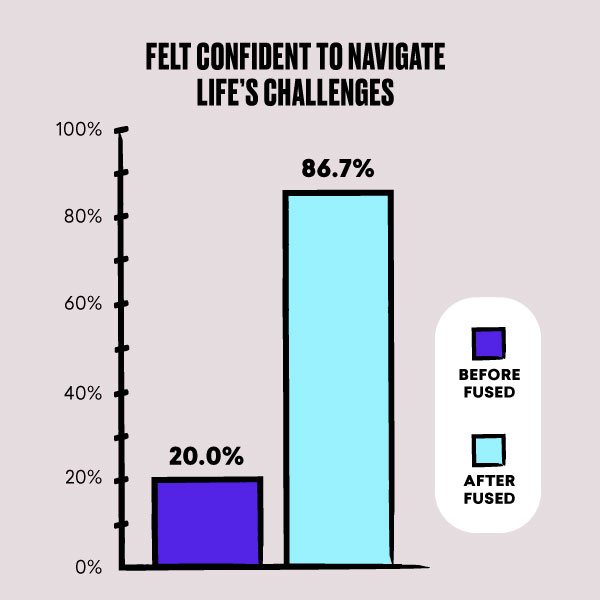
We asked our participants to reflect on how confident they felt to navigate life’s challenges before and after Fused. We’ve always believed that Reach equips young people with the tools to do this, but in the midst of a global pandemic and the start of a recession, we put this to the test.
And it’s clear that from participating in a Reach program, there was a positive shift. This demonstrates the importance of preventative and early intervention workshops to support the mental health and wellbeing of young people. Like all programs at Reach, there is a robust program logic in place to ensure that the content designed by our Crew build social and emotional skills in young people. We also have a wellbeing framework in place to ensure that there is support for participants before, during and after our workshops.

“It gave me hope, motivation and a will to keep sharing my story.”
– Participant

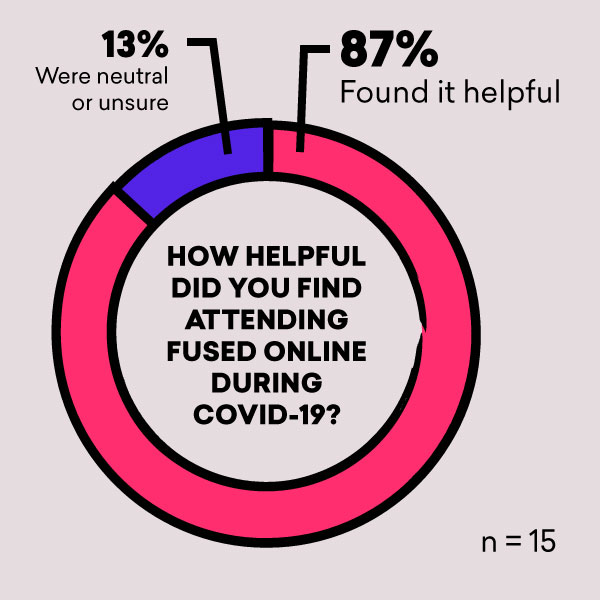
Whilst Fused is a legacy program of ours, what was clear is how relevant and needed it is especially during the current climate. Adolescence is complex already and this, compounded by isolation and other pressures highlight the value of this program.
With 87% of participants agreeing they found it helpful during COVID-19, we need to continue delivering this program as the pandemic unfolds.
“I always love the leaders and the way everyone treats each other. I feel so happy about the world every time I’m at Reach.”
– Participant
What did Parents and Guardians say?
We asked parents and guardians of participants to share their observations of how Fused was impacting their young person. Below is a before, during and after observation of 3 different young people:
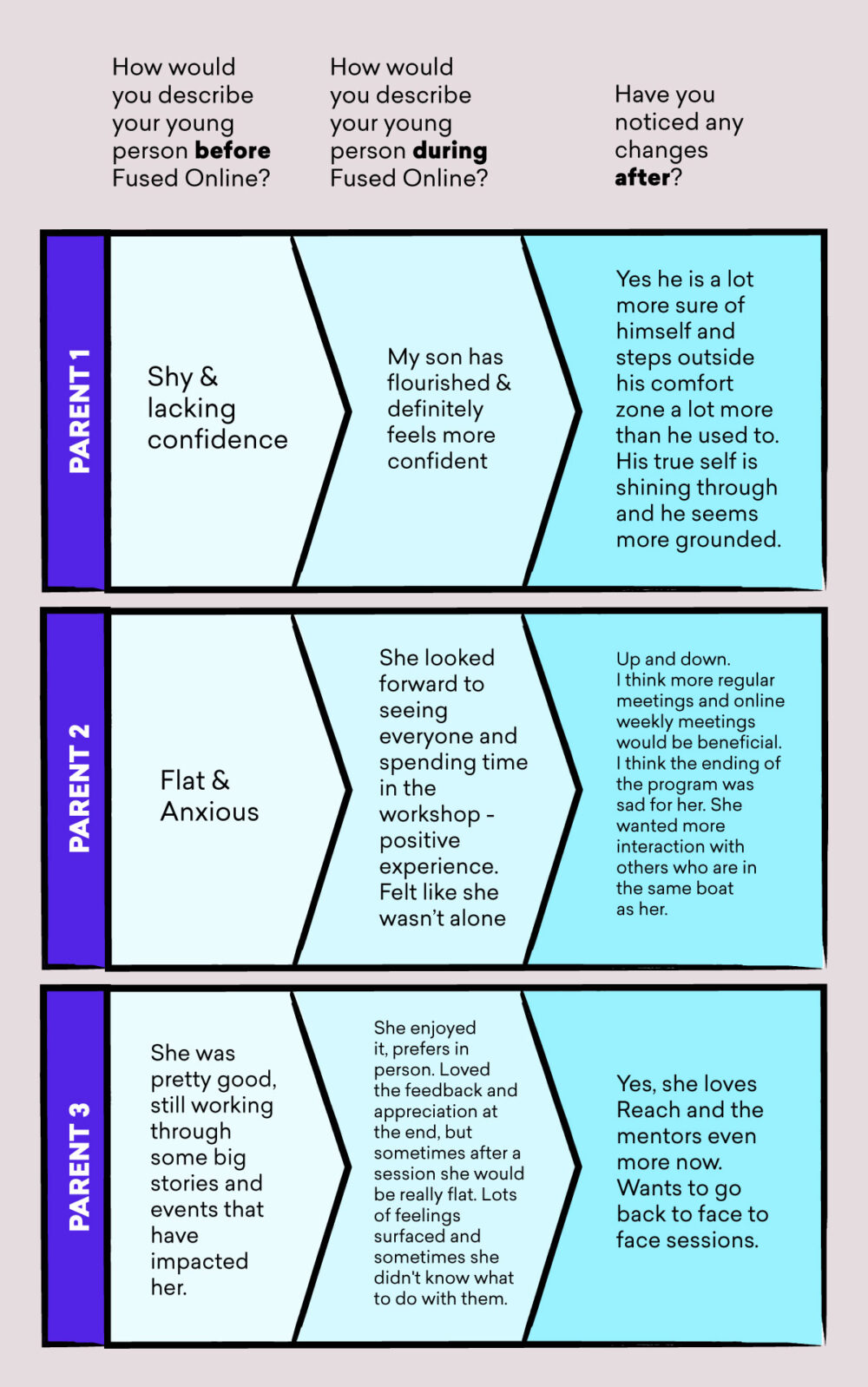
As we continue to evolve our program offering, we are increasingly looking for ways to help facilitate connection between a young person and their parent / guardian. We’re excited to deliver our Turning Tides program in partnership with Headspace Bankstown, and will continue to seek feedback from parents and guardians.

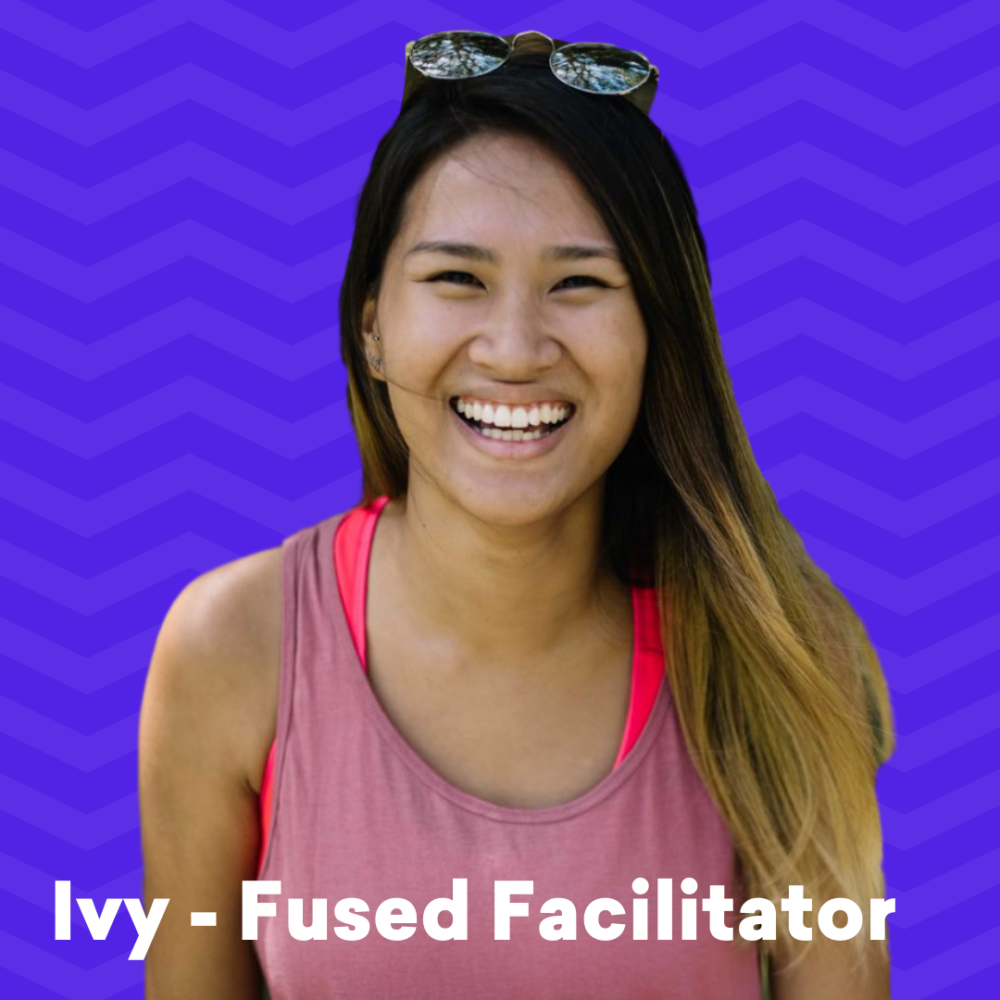
“I was concerned about it being difficult to facilitate people online and young people not feeling safe to be open and honest, and the dangers of not being able to follow up in person. But participants were surprisingly still open and honest, we had a good system for wellbeing check in’s and it felt safe for participants.”
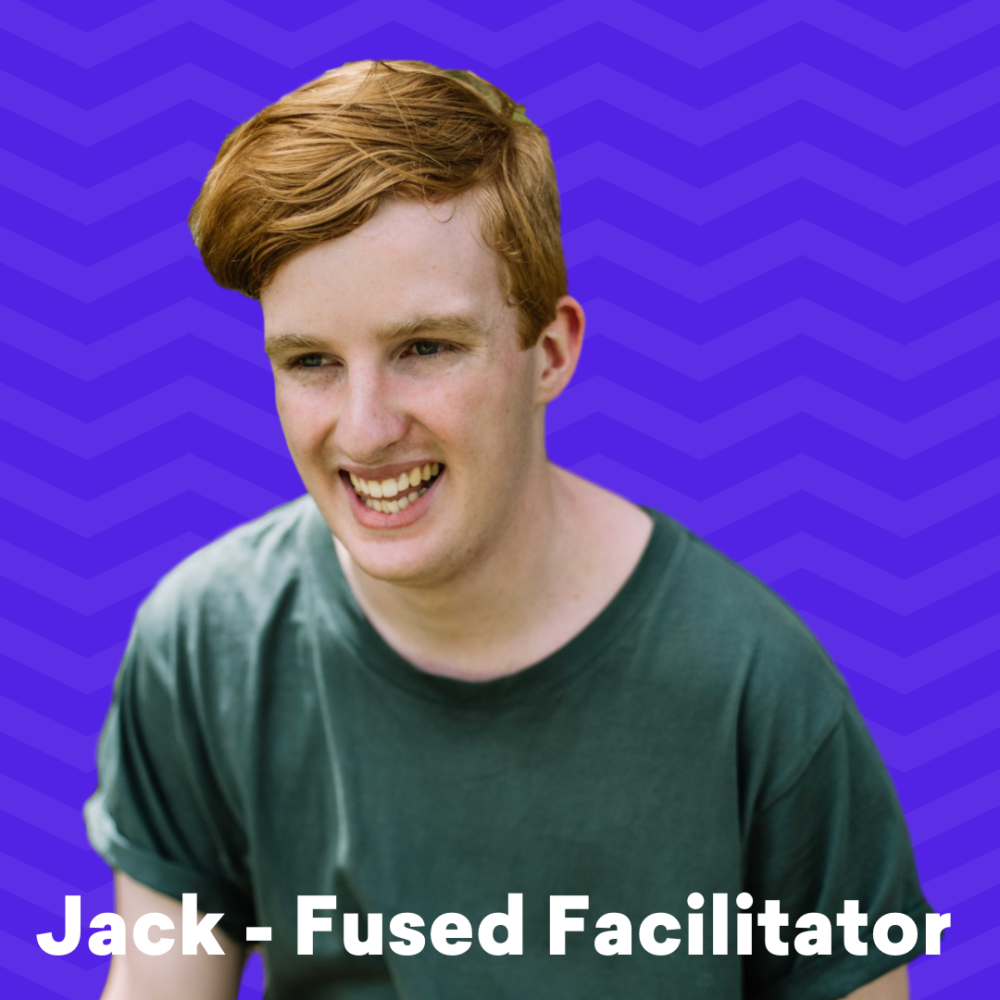
“I was nervous about quite a few things before Fused started, including content not working, young people not wanting to share because their family could hear and about being away from my co-facilitators. But I feel the complete opposite which is nice. I was proven wrong by how willing young people are to speak online and how well our content works online.”
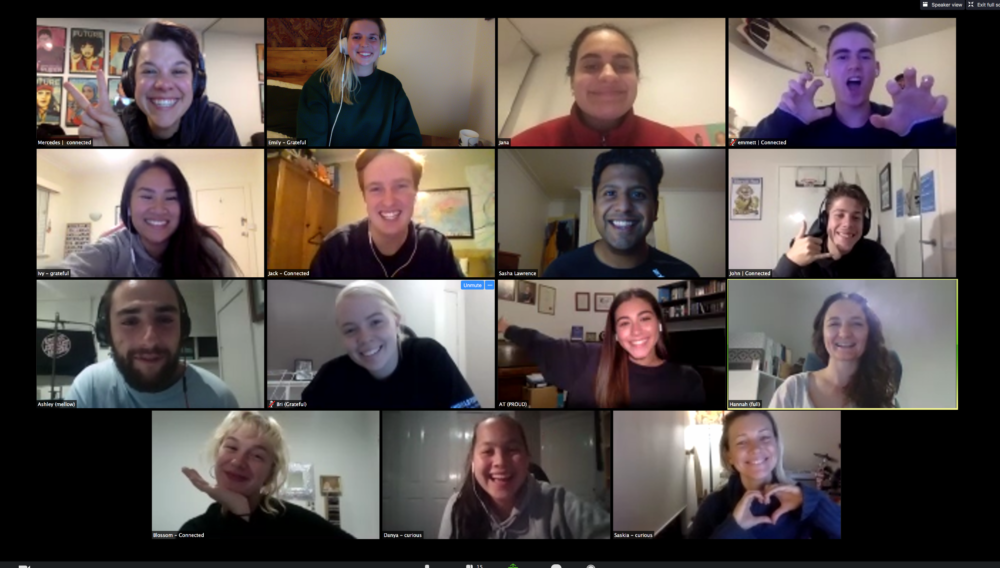

We know that young people can learn the skills to build their resilience, and research tells us some of the key factors that contribute to resilience include feelings of worth, confidence and belonging, supportive trusting relationships, problem solving skills, optimism/hope for the future, willingness to seek support, and connection to a sense of purpose. Just as we can build our resilience we can also build our emotional intelligence. This term of Fused and the evaluation results clearly demonstrate the value this program provides young people. As the world continues to grapple with uncertainty and disruption as a result of COVID-19, young people need spaces like Fused, whether it be online or in person to connect, reflect and sense-make.
Technology in this instance has not only enabled us to continue supporting young people, but for the first time since being founded in 1994, any young person in any part of the country can participate in the same program. Whilst most participants would still prefer to experience Reach in person, there is an appreciation they can at least access our programs virtually.
We’re pleased to announce that Term 3 of Online Fused will kick off on Wednesday 22nd July for 5 weeks. For more information, please email workshops@reach.org.au or click below.

Fused online was proudly supported by David & Kelli Lundberg and Grist Consulting

References
- Steinberg, L. Age of Opportunity: Lessons from the New Science of Adolescence; 2014
- Furber, G., Leach, M., Guy, S., & Segal, L. (2017). Developing a broad categorisation scheme to describe risk factors for mental illness, for use in prevention policy and planning. Australian & New Zealand Journal of Psychiatry. 51(3), 230–240. DOI: 10.1177/0004867416642844
- Earvolino‐Ramirez, M. (2007) Resilience: a concept analysis. Nursing Forum, 42, 73–82.
